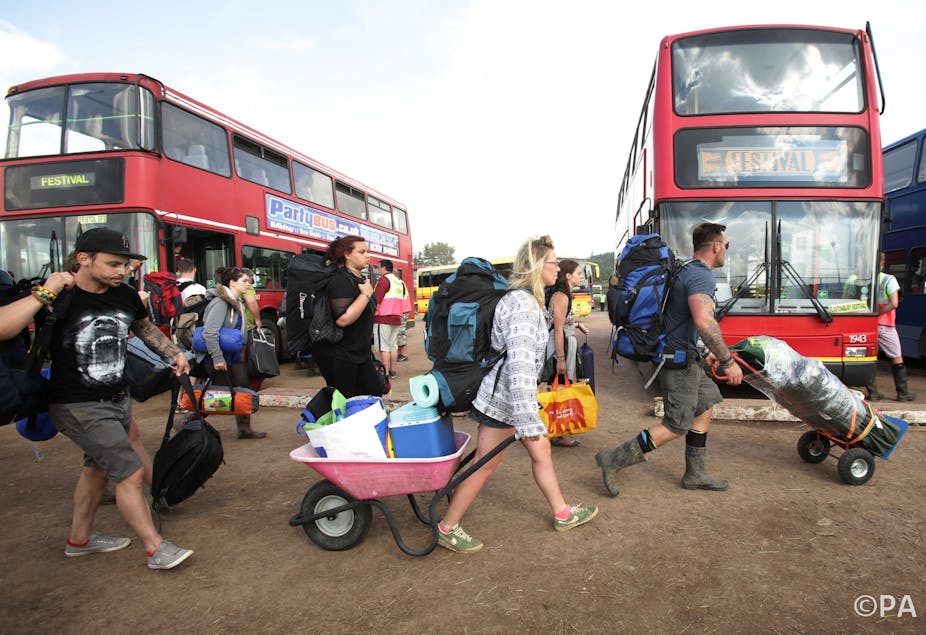As June draws to a close it’s time for what is surely now a Great British tradition, as 135,000 music fans pack their tents and wellies for the iconic Glastonbury Festival. Hailed by many as a spiritual gathering, as well a musical event, Glastonbury gives off an air of being at one with nature – but just how ecologically friendly can such a large-scale festival be?
To answer this question, at least in part, Andrea Collins and I looked into the usefulness of ecological footprinting in managing the environmental impacts of large events. The ecological footprint of an activity is the land area required both to provide its resources and absorb its emissions in the long run. As a species we have exactly one planet’s worth of land available, so we need our global ecological footprint to be less than or equal to one planet’s worth of land. Unfortunately we have already overshot that target and, as it stands, we are all living on borrowed resources.
Our research found that a three-day trip to the annual literary and arts festival at Hay-on-Wye, near the English border in mid Wales, had an ecological footprint 86% greater than the average three days spent at home. Of this, 33% was accounted for by accommodation and 61% by transport to the festival (91% of which was by private car).
The organisers of Hay Festival are working hard to encourage their clientele to travel more sustainably, however. We found that 15% of the total footprint could be cut if everybody shared a car with at least three other people; 28% would be cut if all festival-goers were to travel by coach and 21% of the total ecological impact would be cut if the very small proportion (2%) of visitors who travelled by aircraft didn’t come at all.
The UK in particular has far too large an ecological footprint anyway. If the rest of the world emulated the same lifestyle as the British Isles, our species would need 2.6 Earth-like planets to support the human race. Getting resource use down to a “one-planet living” level is going to take enormous efforts both in terms of technological progress and lifestyle change. Obviously this goes way beyond festivals – it is surely the biggest challenge to face the UK in the coming century – and the stakes are high, with the survival of our entire species depending on it.
But these facts should not dampen the mood any more than rain does at Glastonbury (which, for the uninitiated, it doesn’t). To begin with, Glastonbury likely achieves a lower impact per head than the Hay festival, due to the larger proportion of people using public transport to get there (though that proportion could still improve) and the fact that everybody camps on site.
Camping will certainly have a lower ecological footprint than indoor accommodation, so long as the tents are reused rather than abandoned. After all, the manufacture of goods is one of the biggest ecological impacts our society has – and there is huge potential for reducing it if we only buy goods we need and don’t waste the ones we have. Leaving perfectly good tents behind after the festival is a deplorably wasteful trend of recent years and one that the festival is trying to stop.
More fundamentally though, asking how we can minimise our impact on the world will only ever reveal part of the picture, as it fails to ask what we’re aiming to achieve with our existence in the first place. If we want to view the future with any optimism at all, a better question to ask is: which choices can offer us the best lifestyle per unit of resources consumed? There is some interesting research on this, including the NEF’s Happy Planet Index. That particular league table is topped by Costa Rica which combines high life expectancy with a strong measure of reported well-being and a low ecological footprint.
Glastonbury in particular has one major redeeming factor here: unlike most mainstream festivals, Glastonbury has a 60-acre Green Fields area, filled with everything from bicycle-powered smoothies to solar-powered soundsystems, promoting a wide variety of organisations focused on sustainability and hosting plenty of talks and debates.
Other event organisers have implemented their own green policies, encouraging revellers to take more steps to be eco-friendly, but more can still be done. Several events – albeit on a smaller scale than the giant that is Glastonbury – make use of 100% renewable energy, use local suppliers as much as possible and encourage their staff to lower their travel footprint too.
If having fun at a festival can have lasting impacts on our green behaviour, then it’s surely a worthwhile use of resources, so long as we actually continue to cut the ecological footprint wherever we can.

